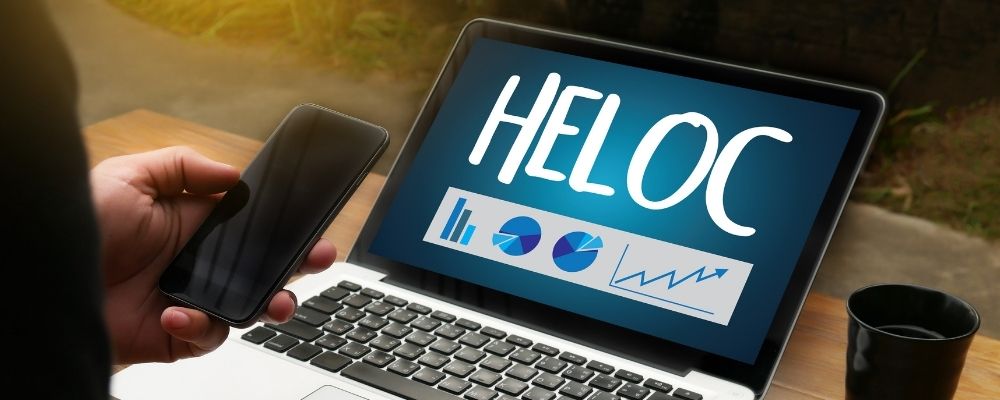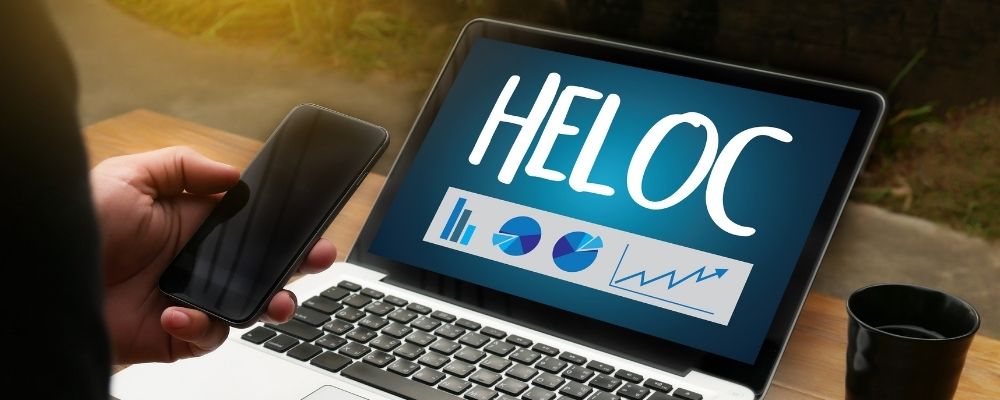If you’ve ever taken out a loan, you know that there are many different financial products you can choose from. But you may not be fully aware of the differences between each loan type. Here is a look at a HELOC vs personal loan – two of the most common financial products homeowners choose when looking to finance a major expense.
Key Points
What is a HELOC Loan and How Does it Work?
A home equity line of credit (HELOC) is a credit line that is secured by a property. When you get a HELOC, the lender agrees to use the equity in your home as collateral. So, the amount of equity you’ve built will determine how much money the lender will agree to give you.
A HELOC is similar to a second mortgage, but the funds are provided as a credit line, rather than a lump sum. This means you can use it like a credit card and borrow when you need the funds, then pay it off at a later date. But because a HELOC is secured by a physical asset, it will typically feature a lower interest rate than most credit cards.
You can use a HELOC to pay for all kinds of common expenses including home improvement projects, emergency expenses, weddings, college tuition, medical bills, etc. There typically aren’t many stipulations on how the money is used– as long as it’s legal.
But you will have to pay it back with interest – so it’s important to have a repayment plan before you start spending. If you default on the loan, the lender has a right to seek a court judgment against you and potentially repossess your home.
What is the difference between a HELOC and a personal loan?
The biggest difference between a HELOC vs personal loan is that a personal loan is typically unsecured – meaning the borrower does not have to provide any collateral to be approved. Therefore, the underwriting standards of a personal loan are based solely on the credit score and income of the borrower. A HELOC also requires the borrower to meet certain minimum standards as well, but tends to be more lenient as long as they have the equity.
Personal loans also tend to carry higher interest rates than a HELOC because they are unsecured. But you aren’t required to provide any collateral with a personal loan, which can be helpful if you aren’t a homeowner.
Both are viable options for financing a large expense and can be used for almost anything. But HELOCs tend to be favored by those who have the equity built in their homes because they offer lower interest rates and tax advantages.
Personal Loans Pros and Cons

Personal loans are a great way to finance an emergency expense or home improvement project. But like any financial product, they have their pros and cons.
PROS
- Easy to apply: Personal loans are offered by a variety of different lenders – including banks and online brokers. The application process for a personal loan is usually simple. As long as you have all your financial information in order, you can often find out if you’re approved in minutes.
- No collateral needed: Personal loans typically don’t require borrowers to provide any collateral, as long as you meet the income and credit requirements. This can be great for younger borrowers and those who do not own a home.
- Low-Interest Rates with Good Credit: The terms of a personal loan will vary depending on the lender, but typically you can get a good interest rate if you have good credit. Plus, personal loans typically feature a fixed interest rate, which makes repayment simple and predictable.
CONS
- Lender Fees: Many lenders charge an origination fee, which is typically equal to about 0.5 -1% of the loan amount.
- Good Credit Required: You must be creditworthy to be approved because collateral is not required. So, if you don’t have any credit or your credit is bad, you may be denied or get hit with a high-interest rate.
- Funds May Be Limited: The amount of the loan depends entirely on the lender and your own creditworthiness. So, there are no guarantees that you’ll be approved for the amount of money you need.
HELOC Pros and Cons

HELOC’s tend to be favored by those who have the required equity in their homes. However, they also have pros and cons.
PROS
- Lower Interest Rates: HELOCs tend to carry lower interest rates than unsecured loans because the lender assumes most people will repay rather than lose their homes.
- Tax Advantages: In some cases, you can use the interest payments as a tax deduction, especially if you’re using the funds for a home improvement project.
- Only Borrow What You Need: Having a line of credit, as opposed to a lump of cash, can be useful because you can borrow what you need and pay it off as you go.
CONS
- Risk of Losing your Home if You Default: The biggest risk of a HELOC is that you may lose your home if you default on the loan. That’s why it’s vital to have a solid plan for repayment before you borrow.
- Adjustable Interest Rates: Although the terms of the loan depend on the lender, many HELOCs carry adjustable interest rates. This means the amount of interest owed each month will fluctuate over the life of the loan. So you have to pay attention to the terms of the loan to ensure you don’t get caught off guard.
- Closing Costs and Other Fees: HELOCs also come with closing costs which can get expensive. These include application fees, origination fees, appraisal costs, early repayment fees, and so on.
Should I Get a Personal Loan or a HELOC?
It all depends on your financial outlook and the circumstances of the loan. Obviously, if you do not own a home or do not have much equity built yet, then a HELOC is not feasible. For those that do have considerable equity, a HELOC is attractive because it offers lower interest rates and a flexible repayment schedule.
But the application and underwriting process can get more involved than a personal loan because the property must be appraised to confirm its value. Therefore, if you just need some quick cash, a personal loan may be easier.
The wise thing to do is get a quote on interest rates for both and then weigh the pros and cons. This will help you determine whether it makes sense to use your home as collateral or go with an unsecured loan instead.

